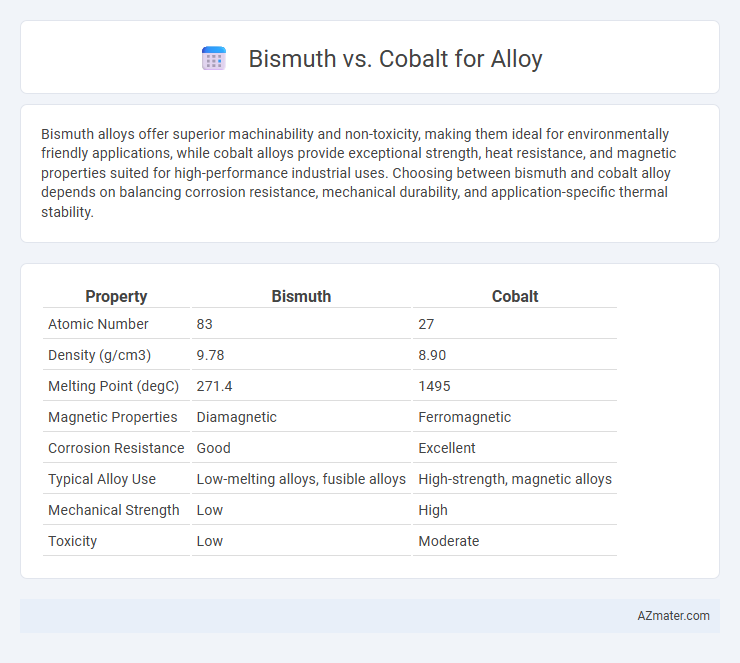Bismuth alloys offer superior machinability and non-toxicity, making them ideal for environmentally friendly applications, while cobalt alloys provide exceptional strength, heat resistance, and magnetic properties suited for high-performance industrial uses. Choosing between bismuth and cobalt alloy depends on balancing corrosion resistance, mechanical durability, and application-specific thermal stability.
Table of Comparison
| Property | Bismuth | Cobalt |
|---|---|---|
| Atomic Number | 83 | 27 |
| Density (g/cm3) | 9.78 | 8.90 |
| Melting Point (degC) | 271.4 | 1495 |
| Magnetic Properties | Diamagnetic | Ferromagnetic |
| Corrosion Resistance | Good | Excellent |
| Typical Alloy Use | Low-melting alloys, fusible alloys | High-strength, magnetic alloys |
| Mechanical Strength | Low | High |
| Toxicity | Low | Moderate |
Introduction to Bismuth and Cobalt in Alloys
Bismuth and cobalt are distinct metals commonly used in alloy production, each offering unique properties tailored to specific applications. Bismuth, a heavy, brittle metal with low toxicity and a low melting point, enhances machinability and reduces melting temperatures in alloys such as low-melting solders and fusible alloys. Cobalt, a hard, ferromagnetic metal with high melting point and excellent corrosion resistance, is prized in superalloys and magnetic alloys for aerospace, medical implants, and cutting tools.
Elemental Properties: Bismuth vs Cobalt
Bismuth and cobalt exhibit distinct elemental properties that influence their use in alloys; bismuth has a low melting point of 271.5degC and is known for its low toxicity and high density (9.78 g/cm3), making it ideal for environmentally friendly, low-melting alloys. Cobalt, with a much higher melting point of 1495degC and a density of 8.90 g/cm3, offers superior hardness, magnetic properties, and corrosion resistance, making it essential for high-strength, heat-resistant alloys in aerospace and medical applications.
Alloying Behavior and Compatibility
Bismuth exhibits limited solubility and low mutual miscibility when alloyed with cobalt, often leading to phase separation and brittleness due to its larger atomic radius and distinct electronic structure. Cobalt forms solid solutions and intermetallic compounds more readily with transition metals, offering superior mechanical strength and thermal stability compared to bismuth-containing alloys. The incompatibility of bismuth with cobalt restricts its use primarily to applications requiring low melting points or specific lubricating properties rather than structural alloying.
Physical and Mechanical Properties Comparison
Bismuth exhibits low density (9.78 g/cm3) and poor mechanical strength with a melting point of 271.4degC, making it useful for low-stress, non-toxic alloy applications. Cobalt, with a higher density (8.9 g/cm3) and superior tensile strength and hardness, melts at 1495degC, providing excellent wear resistance and magnetic properties essential for high-performance alloys. Alloys incorporating cobalt deliver enhanced corrosion resistance and mechanical durability, while bismuth alloys prioritize machinability and environmental safety.
Thermal and Electrical Conductivity
Bismuth exhibits low thermal conductivity (about 7.97 W/m*K) and poor electrical conductivity due to its semimetallic nature, making it ideal for applications requiring electrical resistance and thermal insulation in alloys. Cobalt, with higher thermal conductivity (approximately 100 W/m*K) and excellent electrical conductivity, enhances heat dissipation and electrical flow when alloyed. Alloy formulations integrating bismuth optimize electrical resistance and reduce thermal transfer, while cobalt-based alloys prioritize thermal management and electrical efficiency.
Corrosion Resistance and Durability
Bismuth alloys exhibit lower corrosion resistance compared to cobalt alloys, which are known for their exceptional durability and resistance to oxidation in harsh environments. Cobalt enhances alloy strength and maintains structural integrity under high-stress conditions, making it ideal for aerospace and medical applications requiring long-term performance. Bismuth, being softer and more brittle, is typically used in low-stress, biodegradable alloys where corrosion rate and environmental impact are crucial factors.
Environmental and Health Considerations
Bismuth is favored over cobalt in alloys due to its non-toxic, environmentally benign nature, making it a safer alternative for applications requiring reduced health risks. Cobalt poses significant health concerns, including respiratory issues and potential carcinogenic effects from dust and fume exposure during alloy processing. The use of bismuth-based alloys minimizes environmental contamination and occupational hazards, aligning with stricter regulatory standards for sustainable manufacturing.
Cost and Availability of Bismuth and Cobalt
Bismuth is more cost-effective than cobalt, with a lower market price due to its relative abundance and less complex extraction process. Cobalt is rarer, primarily sourced from concentrated deposits in the Democratic Republic of Congo, leading to higher costs and supply chain volatility. The availability of bismuth supports stable pricing for alloy production, while cobalt's scarcity and geopolitical factors contribute to price fluctuations and limited accessibility.
Common Industrial Applications
Bismuth alloys are widely used in low-melting-point applications such as fire detection systems, fusible plugs, and casting molds due to their excellent machinability and non-toxicity. Cobalt alloys excel in high-temperature and wear-resistant environments, finding common industrial use in turbine blades, cutting tools, and medical implants because of their superior strength and corrosion resistance. Both metals serve critical roles, with bismuth favored for safety devices and cobalt preferred for high-performance, durable components.
Choosing the Right Metal: Bismuth or Cobalt for Your Alloy
Bismuth offers excellent non-toxicity, low melting point, and good machinability, making it ideal for biodegradable, lead-free alloys and applications requiring environmental safety. Cobalt provides superior strength, high corrosion resistance, and excellent wear properties, suitable for high-performance aerospace, medical implants, and cutting tools. Selecting between bismuth and cobalt depends on the alloy's required mechanical properties, environmental considerations, and application-specific demands such as biocompatibility or high-temperature durability.

Infographic: Bismuth vs Cobalt for Alloy
 azmater.com
azmater.com